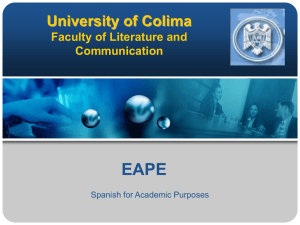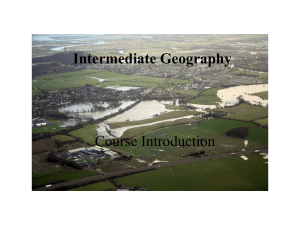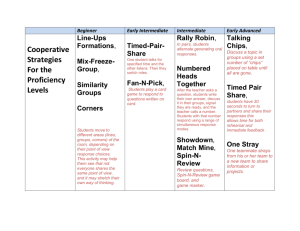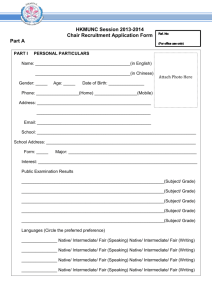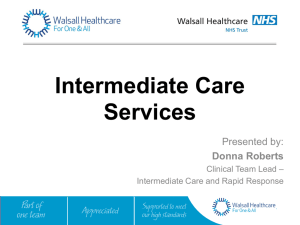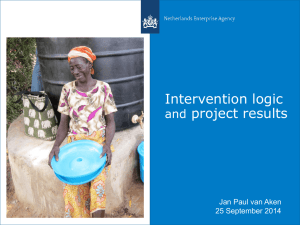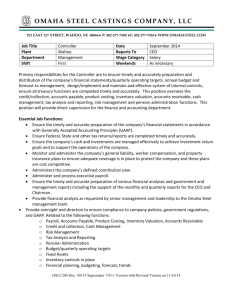Section 4: Skills for Language in Work
advertisement
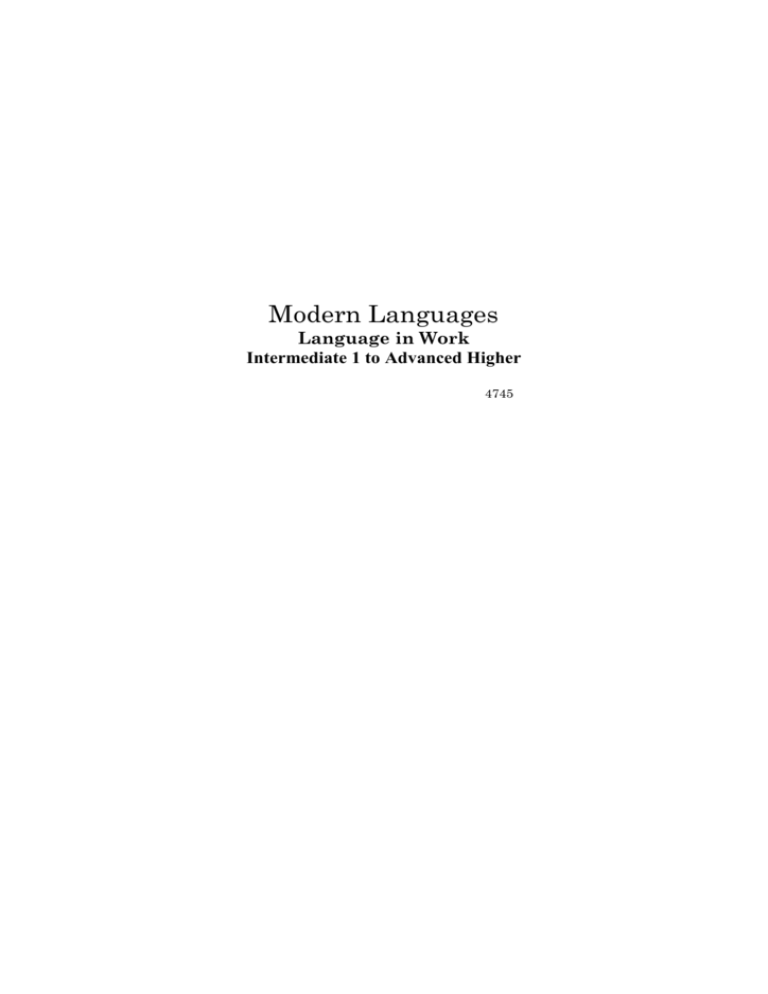
Modern Languages Language in Work Intermediate 1 to Advanced Higher 4745 Spring 1999 HIGHER STILL Modern Languages Language in Work Intermediate 1 to Advanced Higher Support Materials CONTENTS Section 1: Rationale Section 2: Resources for delivering Language in Work Section 3: A guide to published available resources Section 4: Skills for Language in Work Section 5: Delivering core skills Section 6: A student guide Modern Languages Support Materials: Language in Work 1 Modern Languages Support Materials: Language in Work 2 SECTION 1: RATIONALE Why use Language in Work as an optional unit in Higher Still? Relevance Current research seems to be showing that many pupils by the end of compulsory schooling feel that the language they have learned is irrelevant to their future needs. While Standard Grade made great strides in matching languages to the interests and needs of young teenagers, by 15 students often feel the desire for more challenging content and for more relevance in their language learning. The clear formats and tasks of the Language in Work units at each level can help motivate students, and provide relevant content for post-school related needs. The work which will form the basis of the teaching should set a context for students and for classes which is real and local, focussing on local employers and needs. It could, for instance, use correspondence which local employers have actually had to deal with, and present situations which do take place in local work places. The context chosen may be tailored to fit the needs of a community, particular class, or even of a particular group of learners. Thus it may allow students to make the intellectual connection between language learning and use. A new area The syllabus for Higher Still Language has been restricted to enable students to be thoroughly prepared for external assessment. This has to be seen as a positive step, as one factor which has certainly worried learners as well as teachers and lecturers is the unpredictability of external assessment. The knowledge that thorough preparation will bring results will enable the teaching of languages to stand on an equal footing with other subjects. The topics and themes of Intermediate 2 and of Higher Language units develop from Standard Grade, but do not introduce much new ground; rather they develop student competences in these areas. The Language in Work unit will introduce new areas and interests - the formal language which will be needed in the workplace; possible work experience and the chance to develop and use language skills in a new context; vocational language, chosen to fit the student’s future needs. In these ways learners can feel both at home and comfortable in their studies, a situation which does not always pertain at present. In addition it enables learners to feel that they are entering a new and more mature area. Progression The Language in Work Units are intended to start looking beyond school, linking to HNC/D and university and to future vocational needs. They should also be a logical development from the personal language needed at Standard Grade, allowing students to interact with adults in formal situations as well as with teenagers and teachers. Modern Languages Support Materials: Language in Work 3 The units are not vocational as such, in that they do not necessarily direct students to work in a specific vocational context, but rather pre-vocational in that they help prepare students for the demands which a particular vocational course or situation will put upon them. This should be explicit to the students, so that they understand what success or failure depends upon, and what is likely to be expected of them if they are asked to use their language skills in a vocational situation. Language in Work offers opportunities for joint school/college working and centres may wish to explore existing/potential links which might be used to enhance student learning experiences. Curricular links Learners of languages at this level in schools and colleges have a background of using or wanting to use languages, they see themselves in particular vocational contexts in later life which involve other skills as well as modern language skills, and a language is often an adjunct to their main study area. Therefore our courses should offer special links to students in subject areas such as Business Studies and Information and Communication Technology (ICT), and should also link to the formal aspects of communication which are in the English syllabus. Students could be encouraged to use, for example, word processing, desk top publishing (DTP), faxes, the Internet, often skills students already practise in other areas of the curriculum. It is very encouraging if credit is given for prior learning, and there is an opportunity to develop skills in a new context. This can give students more confidence in what they are doing and allow them to feel more in control. The new Scottish Group Award in Arts and Language might encourage the development of such inter-departmental links. Accuracy Industry and commerce need workers who can be efficient and accurate. Language in Work Units train for this, and encourage the use of redrafting, attention to detail such as spelling, and offer the support of formats which help the student to produce work of a high quality. Making use of all available support is self-evident to professional users of language (including ourselves), and is something which we should be training our students to access correctly. We can empower our students, and not make them feel, as they often do, inadequate in situations when they have to use their language skills. Electronic spell-checking, grammar-checking, and the importing electronically of templates are tasks which require a high level of language skill, but which can allow our students to produce work of high quality. As a bonus, such tasks will contribute to students attaining the core skill of Information Technology. (Section 5) Reality Using the classroom or lecture room as a work environment is a contrived situation, but, as far as possible, the imagined situations should be realistic, should offer support for learning, and should prepare for real future situations. If students can connect the tasks they are undertaking with tasks they have elsewhere, or tasks they can envisage undertaking in the future, then motivation will improve. Modern Languages Support Materials: Language in Work 4 Links with external assessment The accuracy and preparation involved in the coursework and internal assessment can support better performance in course assessment. The concepts of accuracy in grammar, spelling and in comprehension are progressively more important as language control develops, and they have a great bearing on the level of attainment at each stage of Higher Still and beyond. The development of these skills through the demands of the Language in Work Units can only help overall attainment. Modern Languages Support Materials: Language in Work 5 SECTION 2: RESOURCES FOR DELIVERING LANGUAGE IN WORK What will help you to deliver a Language in Work unit? To provide an environment which mimics the workplace is not usually going to be possible, and the context which has been chosen by teachers and students will also impose its own demands. However, there are some general guidelines which would normally apply to whatever level and context is chosen. Textbooks (Section 3 gives details) A 40 hour unit is a general preparation for further vocational study or for use of language skills in a vocational environment. Included in the 40 hours would be the development of language skills to the appropriate level, as well as work on the field chosen and preparation for assessment. The textbooks which are on the market place are either general courses which assume some 100 or more hours teaching time, and prepare for a much wider set of tasks than could be covered in 40 hours, or are specific to certain areas. It would make sense therefore to consider a departmental resource bank, with a collection of smaller numbers of textbooks, including for example glossaries of business language, templates for letters, faxes and assessment tasks which would allow students to work towards end of unit assessments. This would allow teachers and lecturers to vary the context for different groups or years, without then having to buy a new textbook, and would also allow more flexibility in choosing the context. It would also allow more flexibility in deciding at which level students should be presented. As support for students, textbooks which come with cassettes or videos of talking assignments could be very valuable. Information and Communication Technology Templates and source material It is desirable that students should have regular access to computers, to produce their written tasks, to store their work, and to practise basic skills such as word-processing, spell-checking, e-mailing, using electronic dictionaries, and downloading templates. They should also have the opportunity to practise telephone skills, even if these are prepared for in a simulated environment, and to fax documents. If the students have chosen to take the Language in Work option, we need to provide them with the opportunity to develop their language skills alongside the skills they will need in the workplace. Students should also have the opportunity to use the Internet, accessing sites in the language they are studying. If possible, these could be interactive sites, allowing for real communication. Students should have access to a wide variety of templates and model letters and documents, to allow them to produce as professional a piece of work as possible. These are commercially available, and are also available electronically, which makes them even more relevant to the student’s needs. Some software has a form of electronic translation, in which students or users are expected to link a set of phrases using their knowledge of language. These exercises are invaluable to students in helping them to develop accuracy and giving them more control over the material they are working on. Modern Languages Support Materials: Language in Work 6 Recording facilities Facilities for pairs or groups of students to record and replay speaking assignments are necessary. These could be PALE systems, recorders with microphones in a separate room, or video-recording. The less constraints the recording systems put on the learners, the more natural the responses will be. Modern Languages Support Materials: Language in Work 7 SECTION 3: A GUIDE TO PUBLISHED AVAILABLE RESOURCES At each of the levels of Higher Still, the Language in Work Unit is a 40 hour unit. In this time a full vocational course cannot be delivered. The units are intended to be integrated into Higher Still courses at the appropriate level, as well as being able to be delivered on a free-standing basis. The units are rather pre-vocational, preparing students for a context where they will be able to develop the skills they have started to learn. This might be in college, university, or in a formal work-place setting. The skills which are developed in the course of working through these units must be the ones which are appropriate to the workplace, such as formal language, accuracy of detail, summarising, communication, reporting, the sending and receiving of short messages, using the telephone and electronic communication. It is also important that students get used to using reference material such as dictionaries, templates and textbooks which will give them material which they can adapt to the needs of a particular task and which will allow them to feel confident in accessing and manipulating language of a formal nature. Many good text books exist, particularly in French and German, and these can be used to deliver Language in Work units at any level. However it must be remembered that in 40 hours it is unlikely that students will work through a complete text book. Firstly, students will normally be working in only one context, and most of the textbooks cover a wider area than this. Secondly, the units will often be delivered as part of a course, and the teaching of the unit will be aimed to complement the teaching of the whole course. These factors will have to be borne in mind when choosing material to deliver Higher Still courses and units. As far as the textbooks are concerned, centres may decide it is more appropriate to buy a set of one book which will cover the needs of all students, or to buy smaller sets of a number of books which students will access as necessary. Centres might also consider building a small library of resources to enable staff to feel more confident in handling material which might be new to them. The following reviews are intended to give teachers and lecturers an overview of what is on the market currently, and to give some indication of which book might be appropriate at which level. The books have been divided into sections by publisher, rather than by level, as in fact many of the books could be used at several levels, and could in fact accompany a student through several consecutive Higher Still courses. The list is not exhaustive, but is based on the lists of the publishers who have, to a greater or lesser extent, specialised in this field: namely Hodder & Stoughton, European Schoolbooks, Routledge, John Murray and Stanley Thornes. Also worth noting is the material produced by Primrose Publishing (Cambridge), namely Tick-Tack language software. These programmes cover language for business use, language for travel and tourism, language for telephone use, and even Tick-Tack CV. They offer templates which are available in Mac, Nimbus, PC, and Acorn formats. They also come with CD-Rom support, and have easily usable accents. Modern Languages Support Materials: Language in Work 8 Routledge Routledge publishes a set of four books in each of the four languages: French, German, Spanish, and Italian. They all give further relevant information on the culture and business language of the specific language, useful for staff and students alike. Business Glossary: a really useful reference book for a departmental library for access by both staff and students. These small books contain around 5000 useful words and phrases in a business context, and provide good source material for preparing written messages and also speaking assignments. They could be used by students from Intermediate 1 through to Advanced Higher. £5.99 Business Correspondence: this has on facing pages in English and the relevant language a variety of written messages, including CVs, faxes, memos, letters. These provide a set of templates for students to produce their own work. These books are also accessible to students of a wide range of linguistic skill, and are relevant to a wide range of contexts. The side by side translation (or rather different language versions: the foreign language versions are appropriate equivalents of the English versions) make them particularly accessible to students with less knowledge of the language, but they would also be of use to staff and to adult learners. £7.99 Business Situations: a collection of over 40 dialogues, again presented on facing pages with a side by side translation (see note above), divided into telephone and face to face conversations, and covering a wide variety of situations. There are also cassettes available of the foreign language versions, useful as a back-up to the scripts. Again this is a reference resource, which students could use to produce responses to tasks set. £7.99 2 cassettes £17.99 A Manual of Business French, German, Spanish or Italian: this is also a very useful reference work rather than a teaching course. This has all the previous three books under one cover: the cassettes also match this textbook. hardback £15.99 £45.00 John Murray Assessment Tasks for Vocational French: a textbook designed to fit the English NVQ and GNVQ system. The book is supported by a tutor’s file and by a cassette. It has a number of references to the National Curriculum for the English context. However, a large amount of the work in the book is of direct relevance to students at Intermediate 1 or 2, and many of the tasks would be ideal preparation for Internal and External assessments. The tutor’s file in particular has photocopy masters for assessment tasks which could be very useful, and cover different contexts, such as Tourism, Hospitality and Business. Much of the rubrics and explanations are in English, which might be seen as an advantage or as a disadvantage. Worth looking at, as a supplement to a course. £7.99 Tutor’s book £40.00 Cassettes £15.00 Modern Languages Support Materials: Language in Work 9 Hodder & Stoughton Hodder and Stoughton have a wide range of texts in French, and some also in Spanish and German. Their catalogue certainly bears studying. A new series might be of special interest for courses which have a context already planned: French (Spanish,German) for Leisure and Tourism, or for Hospitality and Catering: courses are aimed at English NVQ and GNVQ students, but this is not too distracting. Many of the rubrics and tasks are in English. There are cassettes to go with the books French for Hospitality and Catering: would be suitable for Intermediate 2 or Higher, as the level of language needed really demands a good General award at Standard Grade. There is too much to be covered in 40 hours, but this book could provide the basis of a Language in Work unit at either or both levels, with only the writing outcomes not being covered. It would certainly cover most of the work needed at these levels. £10.99 Leisure and Tourism (series, in German, French and Spanish): would be much better at Intermediate 1 level, either for new beginners, or for students who could do with revising basic language. This would cover the Language in Work element, but would also work as a textbook for the whole Intermediate I course, needing supplemented only by materials from the Higher Still support material. The premise of this series is dealing with foreign visitors in the UK, which is also the design of the intermediate 1 Language in Work unit. The series would not be very useful above this level. £11.99 Absolute Beginners’ Business Languages: a more general course, in French, German, Spanish and Italian suitable for a group or class which is aiming at an intermediate 1 course. It would also work well with a group which is only going for an Intermediate 2 Language in Work unit, or for students with weak Standard Grades. The whole book could be covered well within 40 hours, leaving time to assess and if necessary reassess. Rubrics and explanations are in both English and the target language. Cassettes are available. Prices depend on the language. The series offers a general introduction to vocational language. Proyecto España: a Spanish course which could be used at either or both Intermediate 2 and Higher. It would make a suitable course book for a whole Intermediate 2 course, supplemented with Higher still support materials, whilst also covering the Language in Work elements, which would be adequately met here. For Higher students, one would be more selective, using the parts which met the criteria for Language in Work, although it could be useful in some parts of the Language unit. The book, rubrics, exercises and grammar explanations are all in Spanish. £14.99 Modern Languages Support Materials: Language in Work 10 Hotel Europa (series in French, German, Spanish and Italian): intended as a language course, particularly for business users. It could be used at Intermediate 1 for new beginners, although it moves on fast and would need some supplement, but is really more suitable for use at Intermediate 2, where it could be used as a book to help with the Language in Work unit. As a whole course, it is probably of less relevance to schools and would be more at home with adult learners. However, the formal approach to grammar and accuracy might make it a good restart course for students with a General award at Standard Grade, and for students with a background in business studies. It would be well worth considering as a departmental resource. Although most of the rubrics are in the target language, the vocabulary and some cultural/ vocational information is given in English. There are cassettes to go with the course, and interestingly CD-ROMs, which could also help to deliver the additional Information Technology Core Skill Unit. There are also photocopiable assignments which could be very useful preparation material. Worth looking at an inspection copy! £11.99 German /French for Business: books which could only be used by students aiming for Higher. It is pitched at quite a high level, but does extend beyond the scope of the Language in Work unit. It spends a lot of time on grammar and accuracy, with explanations in English and translation exercises which would be good preparation for Directed Writing as well as translation. For a class or group attempting Higher with the Language in Work option, it would be well worth considering as a course book, as a lot of the material and approach could be very relevant to the 80 hour Language Unit. Thus, supplemented by support material, it could give students a sound knowledge of formal German or French, particularly if a more rigorous approach to grammar was wanted. The book would also be useful at Advance Higher level, in the later parts, and could usefully be used over two years for students who wish to specialise in vocational language. The course comes with cassettes. £12.99 French for Business Assignments: this book is set at a similar level to French for Business, but is a collection of 81 varied assessments, all with support. It offers good practice material and is the kind of book a department would want several copies of to allow individuals or groups to tackle assignments which followed on from classwork. This would certainly take away a lot of effort in making up practice assessments. Cassette available. £11.99 Practical Business French/German/Spanish: these courses are a bit unappetising for younger students, and will probably be more useful with adults. However, they do have extensive vocabulary lists covering a variety of situations, and would be useful in a reference library for students preparing for assignments. £11.99 German/Spanish £13.99 Modern Languages Support Materials: Language in Work 11 Matières Premières: a very interesting course for use in Advanced Higher. The material in this would cover areas of the Language in Work unit, but would also be very useful in the Language Unit. Seriously worth looking at if AH course with Language in Work was the goal - it even has prose translation! The themes, which have vocabulary support, could form the basis of discursive writing, and could be very valuable to students. There are twelve chapters on various topics, each of which fits either the Language or language in Work topic areas. Cassette £10.99, Course book £11.99 En Route vers l’Europe: a course which would work well with an Intermediate 2 or Higher class, providing material for the whole course, particularly if the Language in Work Unit was based on work experience. It would make a good compromise for a class which includes both levels, if supplemented with material from the Higher Still support materials. Cassettes are available. £14.99 Vocabulary lists: Hodder & Stoughton also publish a useful glossary/business dictionary in French, German, Spanish and Italian. Ideal to add to the dictionaries in the classroom library. £4.99 Stanley Thornes (in French, German, and Spanish) Stanley Thornes have two ranges which are very interesting: Books Support packs £10 to £12 £77 Working with French, German or Spanish: the French version, by Margaret Mitchell, is at two levels, Foundation and Development. Foundation is aimed at beginners, but could be used with a class aiming at Intermediate 2 who need to look again at basic grammar. However, it would not be a course, rather something to sample from, introducing as it does things like the subjunctive. Development would however be very useful with a Higher group or Advanced Higher, with longer texts in French, a chapter on the telephone, and a variety of activities. The only problem with this very good textbook is that it dates from 1986, so misses out details like faxes. The German and Spanish versions, Level 1 and 2, are similar to the French, in that the Level 1 books are beginners’ courses with a vocational context. They could be used to deliver an Intermediate 1 course, but they are rather dry with an expectation that learners will have a grasp of grammatical concepts. These might be used with learners who already have another language to a reasonable level, or adults looking to find a structure in their learning. They could also be used to work with an Intermediate 2 group, but again would be something from which to sample. The Level 2 books are appropriate for a good Intermediate 2 or Higher group and would provide a good deal of material at these levels. Modern Languages Support Materials: Language in Work 12 Talking Business French, German, Spanish (GNVQ editions): courses are for learners with no knowledge of the language, and are aimed at GNVQ assessments. Their big advantage is that they come with photocopy masters of assessment tasks, which are very suitable as practice for tasks within the Higher Still units and courses, and would save a good deal of preparation time. These courses would certainly be worth looking at if the Accelerated Beginners unit was to be used as an introduction to completing the Intermediate 2 course in one year. Again, they would work best with learners who have already enjoyed some success in another language. European Schoolbooks European Schoolbooks have a huge array of books, all produced outside the UK. This has both advantages and disadvantages: the books are not aimed at the English speaking market, and are normally all in the target languages. Most of the UK textbooks are more in English than in the target languages, but do pay special attention to what are perceived as Anglophone weaknesses. On the whole, European Schoolbooks are more suitable for Higher or beyond students, although some books would make sense to have in the departmental library, allowing students at Intermediate 1/2 access as resource material. Italian has several books, but two are worth mentioning: L’italiano nel Turismo would be suitable for an Intermediate 2 or Higher course based on dealing with Italian in a hospitality context. A workbook and cassette are available. £10.25 L’Italiano per gli Affari: this is an excellent book to use at Higher and Advanced Higher, and would also be useful in the Language Unit, with some longer texts and listening tasks which would be good preparation for course assessment. £15.75 Spanish is also well provided for, with a bright, attractive course. Marca registrada, which could be used at Intermediate 2 or Higher level. It would also provide a large amount of work for the Language Unit, and would be worth thinking about as a course book to be supplemented by Higher Still support materials. £15.50 For the resource library there are also some useful products: a video or CD-ROM, Español de negocios en video, which would be good support for preparing speaking assessments. There is a transcript/workbook available. £ 28.95 The Técnicas series has books on how to use the telephone and how to write business letters. £6.65 Idiomas hoy: a good source for students at Intermediate 1 and 2 as well as Higher, with templates of letters a useful addition. £5.15 Modern Languages Support Materials: Language in Work 13 The German products in the range tend to be set at too high a level for any but Advanced Higher level, although Kontakt Deutsch could be used with a Higher class, and the videos which go with the course would be of great assistance in preparing for the speaking assignments. £11.50 Deutsch im Beruf - Wirtschaft. could be of use in an Intermediate 2 class, but is probably more likely to be of use in the resources library than as a full course. £12.50 Of great use as reference texts would also be the Geschäftskommunikation series: Schreiben und Telefonieren and Verhandlungssprache. These books would be useful at Higher and beyond in preparing students for Unit assessments and for working towards the skills needed here. They also come with either a cassette or CD at the same price. No more rewinding and fastforwarding! £8.95 Also at home in the reference library would be two of the Baustein series, Telefonieren - Schriftliche Mitteilungen and Stellensuche - Bewerbung Kündigung, which give great templates for all kind of written commercial communication. The French products are mainly set at intermediate level, which in France seems to mean post school. One course book which would be suitable at Higher, however, is Le Français de la Communication Personelle, which covers all the needs of a Higher or Advanced Higher French student taking a Language in Work unit. Le Français de l’Entreprise would also be a useful reference book for occasional use in the class library. Modern Languages Support Materials: Language in Work 14 SECTION 4: SKILLS FOR LANGUAGE IN WORK The following lists are the kind of areas in which students at Intermediate 2 and beyond should be developing skills. The lists are not intended to be exhaustive, nor do they make up a syllabus which needs to be covered. The context chosen for the unit will have a great bearing on what skills are actually developed. However the lists could help teachers and lecturers map out a course which will prepare students for internal and external assessment. They might also help to judge whether a given textbook covers enough of the necessary ground. INTERMEDIATE 2 HIGHER (in addition to the Intermediate 2 list) Formal language and situations Workplaces: offices, hotels etc. Introducing and greeting Language in the workplace Telephone skills Formal and informal language in the workplace Introducing oneself in person and over the phone Register Requesting and offering services Jobs and functions Language in e-mails and faxes Writing about own experiences: jobs Description/facilities of company or area Talking to colleagues Promotional material concerning companies or area/towns Talking to employers Articles about companies/products or areas Differences in culture in the target language country Reading company descriptions Reading job offers/descriptions Completing CV Asking for/giving factual information Finding information from longer texts Job preferences Giving reasons for preferences Own experiences eg Work Experience Adding to CV: school/college achievements Standard letters/memos/ seeking/giving information Negotiating arrangements Confirming in writing CV in letter form: from template: initial entry Writing formal messages from template Working routines including times Modern Languages Support Materials: Language in Work 15 SECTION 5: DELIVERING CORE SKILLS The Higher Still Development Programme is commissioning support material which will offer specific subject guidance and advice regarding core skills. The support material provided to individual subjects will include assignments which students will be required to carry out in order to achieve the outcomes of a core skill or components of a core skill. This will allow teachers/lecturers of those subjects which do not carry an embedded core skill, to teach the subject in such a way as to allow students to be accredited with a particular core skill or component of a core skill. In the case of Modern Languages, the core skill being targeted in the first instance will be Information Technology. As this is particularly relevant to the Language in Work unit, initial information is included in this support pack. This preliminary information will allow staff, whether or not they are considering offering the Language in Work unit, to consider whether the approaches suggested are ones they might wish to consider when planning a course or unit. Details of student activities/tasks directly related to the outcomes and PCs of the Information Technology unit will be included in a future support pack. How can language teachers increase the attraction of their subject for students making a decision about what to study at Intermediate 2 and Higher? We can look at offering success, pointing to the marketability of language skills to increase the relevance of the learning to students. A variety of possibilities should be looked at, but one thing we might consider is adding value to the course. To attain a Group Award at Higher, students must achieve at least Intermediate 2 level in the core skills: Communication Numeracy Information Technology Problem Solving Working with Others. The skills of numeracy and communication do not lend themselves to assessment within modern languages, but the other skills could be assessed through the medium of a Higher in a modern language. This would allow students to gain additional units while working towards a qualification in a modern language. Draft specifications for all core skills units are in the document Core Skills: Information for senior managers which is in all centres. If we look at the free-standing unit Information Technology (Intermediate 2), we can see how this might be done through the Language in Work Unit at either Intermediate 2 or Higher. It does have implications for the way the Unit is delivered, but nothing which need adversely affect either teaching or learning. Modern Languages Support Materials: Language in Work 16 The outcomes in these draft units are: 1. Use a computer system effectively and responsibly. 2. Use a range of application areas. 3. Extract and present information from electronic data sources. What does this mean in practice? Students need to have access to a computer or computers which have sufficient programmes installed on them, and students must be able to use these machines. If we follow through the performance criteria in the statement of standards, we can see what that might mean for us. Outcome 1 is about general management of a computer, which many students can already do. PCs (a) and (b) refer to operation and location and management of data and applications. If a student can recognise the functions of various parts of the computer, log on and off, choose a printer, format a floppy, be aware of junk messages and viruses, and can manage files/folders, the PCs are met. PC (c) concerns keeping data secure. Using passwords, files and folders, saving and finding data, and using programmes built into the system cover this. Outcome 2 deals with the use of applications. PC (a) concerns integrating different types of data. PC(b) concerns the output of data to specified formats. Here is where we could have our customised package. If we can get our students to use a word-processing programme, import foreign language accents, use a foreign language spell checker, and possibly a grammar checker, and import templates of letters and messages from a programme such as Pendown into their files to process then they will have also met the criteria for the Information Technology (IT) core skills unit. These are exactly the kind of activities which we would be expecting to do when teaching Language in Work, in order get them to produce a piece of work which meets the criteria for a pass in the Language in Work unit. Outcome 3 deals with extracting and presenting information. PC (a) concerns carrying out searches. PC (b) concerns using tools to import data. PC (c) concerns presenting information. Again, this could be based on extracting a template from Pendown, and manipulating it to meet the criteria of a Language in Work assessment. The fact that in the Language in Work writing outcome students have to produce a folio of four pieces of writing helps meet the criteria for the IT unit. It could also be the task of finding in the Internet information such as hotel lists for a given town, or transport possibilities to act as the preparation for a speaking and/or writing task. It could also involve Modern Languages Support Materials: Language in Work 17 scanning in a letterhead or illustration, or importing a photograph from a digital camera. Many schools and colleges now have the facilities for this. We might also obtain information electronically from our partner schools abroad. Searches could involve taking information from a CD-Rom such as Encarta (in the target language or in English) to extract information, selecting from a bank of templates the one which matches the task in hand, or taking from the Internet relevant information for a task which will lead to an assessment. It should be noted that final specifications for all core skills units will be issued in Spring 1999 and there may be slight changes to wording of outcomes and PCs. The activities described above will still be relevant and will be incorporated into the assignments referred to at the beginning of this section. These will be made available by the Higher Still Development Programme to all centres. Where does this leave us? If we can offer the IT unit, it gives a case for class access to a suite of computers. We can use this to develop students’ redrafting skills, and to work on their presentation skills. We can also provide motivation to many students, and make use of and reward knowledge and skills which many of our students have developed independently. We could also have permanently available on the computer or network we are using material such as a bank of templates, dictionaries, foreign language spellchecking, and access to the Internet, whether direct or in the form of discs such as SCETNet’s extracts. The printed and electronic media can give us a way of encouraging students’ concern for accuracy and willingness to take on board correction. It should be noted that information on various aspects of Technology in Modern Languages can be found in the document Technology in Modern Languages issued to all centres. Appendix A of that document gives details on the importing of foreign language accents which is referred to earlier in this section. Modern Languages Support Materials: Language in Work 18 SECTION 6: A STUDENT GUIDE Why take the Language in Work option? There are many reasons for learning a foreign language, and many uses to which you can put your language skills. However, Language in Work looks to develop your skills for some situations which regularly come up for people at work. In this country, you may be called to deal with someone who speaks little or no English, in a shop, bank, office or factory, in person or over the phone. You may only need to welcome them and find out who should deal with them, or you might have to deal with them yourself. One of the tasks of Language in Work is to teach you to deal with such situations. You may be called upon to deal with mail, faxes, or e-mail in the language you know. It is common in Europe to write in your own language and expect the answer in the language of the person you are dealing with. Language in Work will help you learn the most common forms of communication you might receive, and make it easier to find the important parts of the message. It will also help you to find the correct way to pass this message on. You may be asked to make an arrangement with someone who does not speak English well, in person or over the phone. The Language in Work unit will prepare you for this, by giving you practice in this area, and by teaching you the set phrases and language which you might need in a situation like this. You may be asked to write a message, letter, fax, or e-mail to someone, possibly in response to a message. Language in Work will help you prepare for this. You will be shown how to produce these formats, and where and how to find a bank of sentences and phrases that will make this task easier for you. Employers find it very important that the messages they receive and send are accurate. Language in Work stresses the need for accuracy, and will help you improve your spelling in the foreign language, and the accuracy with which you pass on information. In many colleges and universities there are courses which link with science, business, tourism, hospitality, law, and a whole host of other subjects. The language which is taught in these courses is usually much more vocational, and stresses communication as well as accuracy. The Language in Work unit helps prepare for these courses, as well as for the world of work. If you are considering one of these courses, the Language in Work unit will give you an idea of what to expect, as well as help prepare you for them. What Language in Work hopes to do is move you on from the informal language you already have to the formal language both written and spoken, which you are likely to meet in the workplace. It should also provide you with many of the skills you will need, and make it easier for you to use your knowledge of language in a vocational situation. Modern Languages Support Materials: Language in Work 19

